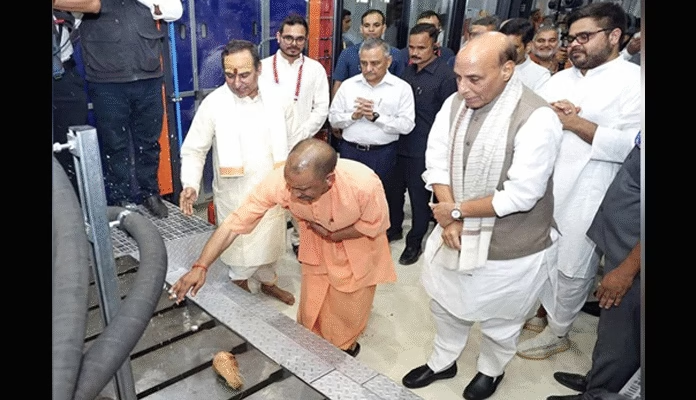
 by Ajay Kumar
by Ajay KumarA shocking incident in Dadarpur village under Bakewar police station in Etawah district, Uttar Pradesh, has triggered widespread outrage across religious, social, and political spheres. Bhagwat Katha narrator Mukut Mani Yadav and his associate Sant Singh Yadav were allegedly subjected to abuse, assault, and caste-based humiliation. This incident not only shook the soul of Sanatan tradition but also exposed the mindset of a society still trapped in the illusion of caste superiority.
According to Mukut Mani Yadav, he had come to the village to narrate the Shrimad Bhagwat Katha. During the event, some of the organizers asked about his caste. Upon learning that he belonged to the Yadav community, they not only stopped the Katha but also removed him from the stage, verbally abused him, cut his sacred tuft (choti), shaved his head, and allegedly forced him to rub his nose on the ground before a woman as an apology. He further claimed that they urinated on his face and broke his harmonium. The incident was caught on camera, and once the video went viral, strong reactions erupted across the state.
Samajwadi Party national president Akhilesh Yadav condemned the incident as the height of caste dominance and launched a scathing attack on the ruling BJP. In a press conference in Lucknow, he sarcastically said that if caste certificates are now mandatory for narrating religious discourses, then the Yogi government should legislate accordingly. He honored Mukut Mani Yadav and Sant Singh Yadav by gifting them ₹21,000 each and announced a party contribution of ₹51,000 to both. He termed the incident as yet another example of the continuous humiliation faced by the PDA communities Backward classes, Dalits, and Minorities in BJP-ruled states.
As political turmoil intensified, the case took several new turns. The Yadav Mahasabha, Samajwadi Party, and other organizations came out in support of the narrators. On the other hand, a woman from the village, Renu Tiwari, and her husband Jaiprakash Tiwari came forward with serious allegations against the narrators. According to Renu Tiwari, the narrator allegedly tried to hold her finger during a meal, which made her uncomfortable. She immediately informed her husband, and a group of local youths became enraged. The woman’s side claims that the narrator entered the village posing as a Brahmin, and the conflict escalated when his real caste was revealed. It was further alleged that the narrator used a fake Aadhaar card to present himself as a Brahmin.
Now, the case has taken a new twist as the woman has lodged a formal complaint with the police. Superintendent of Police Brijesh Kumar Srivastava assured an impartial investigation after hearing both sides. So far, the police have arrested four individuals Ashish Tiwari, Uttam Awasthi, Manu Dubey, and Nikki Awasthi for assaulting the narrators. However, questions are now being raised about the narrator’s Aadhaar card, with reports of different names and castes under the same photo, complicating the investigation.
Following this development, the Brahmin Mahasabha has also taken a stand. Its state president Arun Dubey said that the narrator misled society by posing as a Brahmin. He insisted that if there was any misbehavior with a woman, action should be taken against the guilty. He also warned that if action is taken based on one-sided claims, the Mahasabha would launch a protest. According to him, anyone can narrate a religious discourse, but misusing the platform for inappropriate behavior cannot be tolerated.
Meanwhile, the Samajwadi Party alleges that the entire episode is a conspiracy to falsely implicate the narrators and disrupt caste solidarity. S.P. district president of Etawah, Pradeep Shakya, pointed out that the woman’s complaint came two days after the incident, only after political pressure mounted. He questioned, “Are Yadavs not Hindus? Do they not have the right to narrate religious stories?” He claimed that the entire episode is part of a conspiracy to insult the PDA communities.
This dispute has now reached a crossroads of religion and caste, where the core values of Sanatan tradition are being tested. Does only a Brahmin have the right to narrate religious discourses? If we refer to scriptures and religious texts, it is evident that no such rule exists. Sage Vedvyas himself, who established the tradition of Vyas Peeth, was born of a mixed lineage his father was sage Parashar and his mother Satyavati, a Nishad (fisherwoman). Sootji, considered the chief narrator of the Bhagavat Purana, was also of mixed caste. Shabari, a tribal woman, was revered by Lord Ram for her devotion. In the Vyadha Gita, a hunter gives a discourse on Karma Yoga to a Brahmin sage. Prahlad was born in a demon clan but is honored as the greatest devotee of Vishnu.
These examples prove that in Sanatan Dharma, knowledge, devotion, and discipline are paramount not caste. If Mukut Mani Yadav and Sant Singh Yadav narrated the Katha with genuine devotion and were humiliated solely due to their caste, then it is a grave insult to the Sanatan tradition. However, if the allegations of misconduct towards the woman are true, then that too is equally condemnable. Justice can only be served through an impartial and transparent investigation of both sides.
This episode also exposes the insensitivity of our social structure. When it comes to religion, we often use rituals to demean each other. If the narrator concealed his caste, that is wrong. But if he was assaulted, forced to grovel, and insulted merely because of his caste, that is a far greater crime. Such acts not only degrade humanity but also shake the foundation of India’s pluralistic fabric.
Politically, this incident could influence caste equations ahead of upcoming assembly elections. The Samajwadi Party is presenting it as an “atrocity on backward classes,” while groups linked to the BJP view it as an attack on Brahmins. By fueling the Yadav vs. Brahmin discourse, political parties are serving their interests, but the real issue equality, justice, and respect for religion is being lost.
The Etawah incident is not just about one village or one person. It is a warning that if we continue to divide religion along caste lines, we will lose its true essence. The soul of religion lies in compassion, knowledge, and service. Whether the narrator is Soot or Yadav, Shabari or Vedvyas, their dignity can only be preserved if we judge them by their intent, not by their caste certificate.
As a society, we must now decide the path forward towards a future where knowledge, devotion, and religious freedom are for all, or into a darkness where a person is humiliated solely on the basis of caste. If even today we cannot accept that a narrator is not wrong simply because he is a Yadav or not a Brahmin, then we are not truly in the 21st century we are still living in the decaying era of the caste system.
This incident compels us to reflect Is religion still a casteist idea, or a universal consciousness? Are we the heirs of Vedvyas, Valmiki, Shabari, and Prahlad, or are we merely carriers of caste pride and social hatred? The answer must come collectively, and it must uphold justice, equality, and constitutional values above all.



